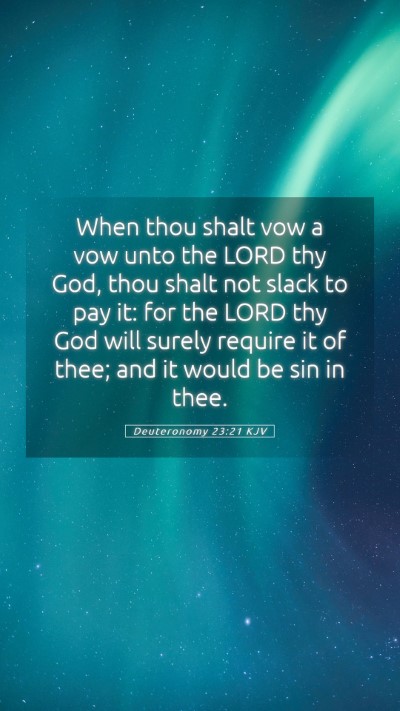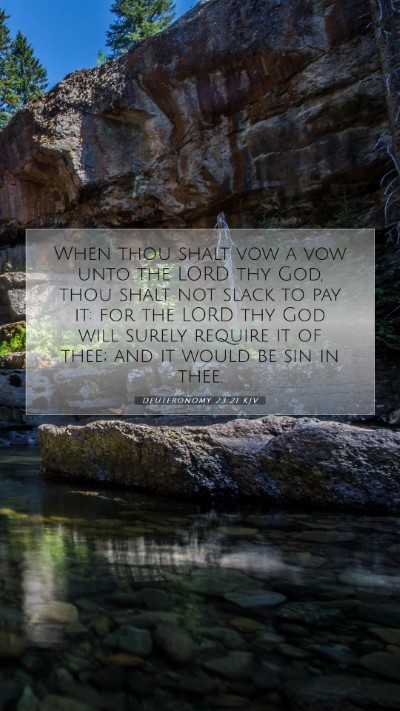Understanding Deuteronomy 23:21
Verse: "When thou shalt vow a vow unto the LORD thy God, thou shalt not slack to pay it: for the LORD thy God will surely require it of thee; and it would be sin in thee." (Deuteronomy 23:21)
Overview of the Verse
This verse addresses the importance of fulfilling vows made to God. It emphasizes accountability and the seriousness with which one should approach commitments made in the name of the Lord. The instruction serves as a reminder of the reverence required when engaging in acts of devotion, linking the act of making a vow with moral responsibility.
Commentary Insights
Matthew Henry's Commentary
Matthew Henry highlights the spiritual significance of vows. He explains that when individuals make promises to God, it signifies a deep commitment and a recognition of God’s sovereignty. Henry points out that failing to fulfill such vows is not merely a neglect of one’s promise but is considered a sin, drawing us into a deeper understanding of our responsibilities before God. He further notes the need for sincerity in the act of making vows, encouraging believers to reflect on their commitments before making them.
Albert Barnes' Notes
Albert Barnes emphasizes the contrast between human commitments and divine expectations. He interprets this verse as a directive to take vows seriously, suggesting that such pledges should not be made impulsively. Barnes highlights that God holds individuals accountable for their promises, underscoring that the fulfillment of vows is both an act of obedience and reverence. He reminds readers of the importance of reflecting on the gravity of promises made to the Almighty.
Adam Clarke's Commentary
Adam Clarke provides insights into the cultural context of vow-making in ancient Israel. He notes that in a society deeply rooted in covenant, vows related to worship and commitment to God carried significant weight. Clarke reinforces the message that failure to pay a vow is not only a breach of trust but also reflects a lack of faithfulness to God. He comments on the need for individuals to consider their ability to fulfill a vow before making it, citing the need for foresight and integrity in one's promises.
Thematic Insights
- Accountability: The verse stresses the believer's obligation to uphold their word. Failing to do so reflects a disregard for the covenant relationship with God.
- Spiritual Commitment: Making a vow is seen as an outward expression of one's inner faith and devotion. It fosters a deeper connection with the divine.
- Moral Responsibility: The passage indicates that neglecting a vow is sinful, urging believers to recognize the seriousness of their commitments.
Application in Daily Life
When we contemplate the meaning of this verse, it's essential to apply its teachings to our lives. In our modern context, this might involve understanding the weight of our promises—whether in prayer, community agreements, or personal commitments. Reflecting on the seriousness of our words encourages a lifestyle of integrity and consistency.
Cross References
- Ecclesiastes 5:4-5: Discusses the importance of fulfilling vows made to God.
- Numbers 30:2: Addresses the necessity of following through on a vow.
- Psalm 76:11: Encourages giving to God what one has vowed.
Conclusion
The interpretation of Deuteronomy 23:21 brings to light essential principles about the nature of vows and the importance of honoring commitments before God. As believers, understanding the depth of our pledges fosters authenticity in our relationship with the divine. Strive to apply these teachings in your daily walk and engage in meaningful Bible study insights within your Bible study groups or personal reflection.


